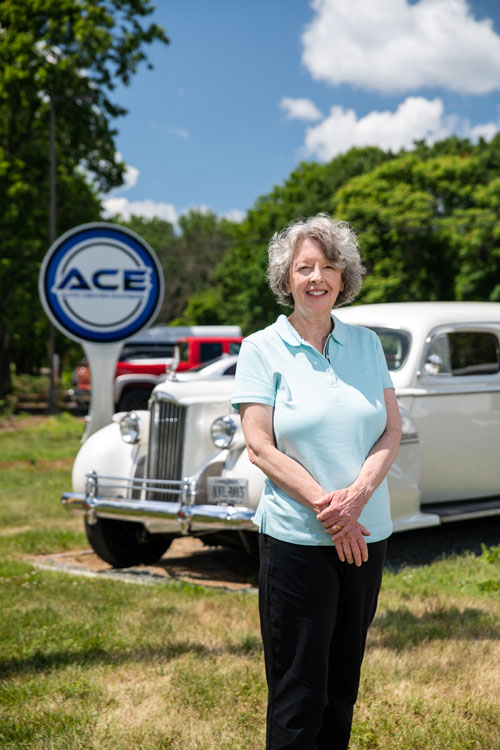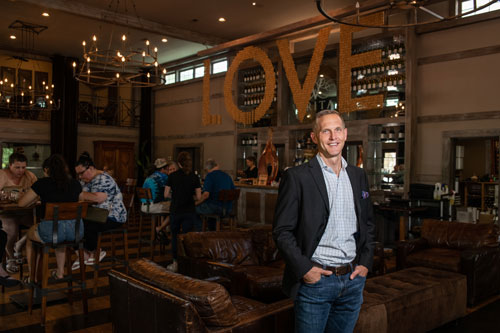Weathering the storm
Charlottesville small businesses persevered through pandemic
Weathering the storm
Charlottesville small businesses persevered through pandemic
Before the COVID-19 pandemic, Angelic Jenkins was working toward opening a brick-and-mortar restaurant serving updated versions of the soul food staples she grew up with.
On weekends, Jenkins and her husband catered parties and drove the Angelic’s Kitchen food truck they bought in 2018 to festivals around Virginia. And on weekdays, she worked at her full-time job as the human resources director at the Doubletree by Hilton Hotel in Charlottesville.
When the pandemic shut down the hospitality sector, Jenkins’ schedule at the hotel was temporarily reduced to one day a week, and her husband was laid off from his position as a driver for US Foods.
The couple needed to find a way to keep bringing in income to help them build out their restaurant, which was slated to open in December 2020 in Charlottesville’s new Dairy Market food hall.
“We decided to open the food truck every day. We both just put all of our energy into it,” Jenkins says.

They expanded from their usual food truck location on Pantops Mountain to serving food in neighborhoods around the city during a time when people were looking for dine-out options that could operate under the pandemic public health strictures.
Their business was kept afloat during the pandemic by regular orders for hundreds of meals from World Central Kitchen, a Washington, D.C.-based global nonprofit that delivers meals to families and seniors who are food insecure. Jenkins donated beverages to accompany the meals.
As the months wore on, the hotel restored some of Jenkins’ hours, but after
20 years there, she decided to retire in favor of opening her restaurant. She worked with the city of Charlottesville, Dairy Market developer Stony Point Development Group and the Community Investment Collaborative incubator to access grants and loans that helped her get Angelic’s Kitchen ready to open with the rest of the Dairy Market food hall on Dec. 15, 2020.
“It was really scary,” Jenkins says of the past 16 months, “but everything ended up working out.”
Small business owners around the Charlottesville region are beginning to exhale after more than a year of white-knuckled twists and turns, as the pandemic shredded old business models but also revealed new opportunities and lessons for the future.
Pandemic pivots
“Initially there was a fair amount of panic and concern across all industries, but I think we saw pretty quickly a considerable ability to pivot business models and try to be resilient,” says Charlottesville Economic Development Director Chris Engel.
The city saw the pandemic’s economic impact in its meals and lodging tax collections. City budget writers have projected that these two major revenue sources will not reach pre-COVID levels until at least July 2022. By March 2021, however, the revenue had rebounded considerably, with meals taxes at 80% of pre-COVID levels and lodging taxes at 65%, Engel says.
The extended shutdown had a major impact on the region’s tourism industry. According to Project Rebound, a report produced by a collaboration led by the Charlottesville Regional Chamber of Commerce, leisure and hospitality jobs made up 10.9% of non-farm employment in the region in February 2020. That dropped to 7.6% by April 2020.
The pandemic’s economic impact particularly hurt businesses that rely on business and tourism travelers.
Andrea Saathoff, owner of Albemarle Limousine, watched 90% of her transportation business disappear after the coronavirus shut down business travel, weddings, corporate entertainment and sports team travel in one fell swoop.
“I had a couple of workers saying, ‘Are we going to get laid off?’” Saathoff remembers.

Veritas Vineyard in Nelson County. Photo by Caroline Martin
Saathoff and her workers channeled that fear into a new enterprise.
Ace Bicycle Charlottesville opened in spring 2020 under the same roof as Albemarle Limousine, matching existing skills in Saathoff’s workforce with the huge demand for bicycle maintenance prompted by the pandemic.
Saathoff’s 50 employees also switched gears to pour more labor into a 10-year-old Albemarle Limousine side business — a car washing and detailing service called Virginia Auto Detailing.
“We used our time where we were not providing transportation to try to grow and develop and nurture these little businesses,” Saathoff says. “In a way, surviving the pandemic requires the same kind of skills that entrepreneurship requires. … You have to be ready to quickly take advantage of changing opportunities and changing trends.”
It also requires an appetite for risk, something that Saathoff didn’t shy away from during the shutdown.
As the company’s detailing business outgrew Albemarle Limousine’s small indoor facility, Saathoff began seeking a real estate property where she could open an auto repair business, using the in-house mechanics she’d hired in recent years.
She jumped on the opportunity when Edgecomb’s Auto Sales and Service — a longtime Charlottesville family business — announced in September it was closing for good. Saathoff worked with the Central Virginia Small Business Development Center to secure financing to buy the property and opened Ace Auto Center Express in January.
As the pandemic eases, all four of her businesses are busier than ever, even the bicycle shop, which Saathoff acknowledges was a move of “pure desperation” amid a sharp, pandemic-fueled drop-off for her transportation business.
Relief funds
That’s a feeling many other business owners find relatable.
“This time last year, we were terrified,” says George Hodson, CEO of Veritas Vineyard in Nelson County.
The winery faced the prospect of having to maintain its vineyards and keep its production cycle moving even while its events, restaurant and retail activity ground to a halt.
But the shutdown generated an appetite for venues where families could get out of the house and enjoy a safe and distanced environment. Like many other wineries, Veritas found that its sprawling property fit the bill.
“We had more families, more people here for a much longer time,” he says.
Veritas opened a pop-up restaurant — cheekily named Phase II as a play on Virginia’s COVID-19 restriction level that allowed for on-site dining — and bought igloos to accommodate winter dining.
The shutdown also accelerated a trend Hodson says was already anticipated in the wine industry.
“People have been predicting this tide for years when consumers stop buying wine in stores and got it shipped to their homes,” he says.
With so many Americans working from home, people were able to meet the delivery person during the day to give the signature that had traditionally been the obstacle to widespread online alcohol sales. Hodson says Veritas saw 500% growth in its e-commerce business during 2020.
Providing a stream of funding to keep small businesses going kept localities and regional business development groups busy throughout the pandemic. Government and nonprofit partners in the Charlottesville region got creative to find ways to get cash flowing to businesses that fell through the cracks of federal initiatives such as the Paycheck Protection Program.
Charlottesville partnered with Albemarle County to put money into a revolving loan fund run through the Community Investment Collaborative (CIC), a regional business incubator.
CIC President Stephen Davis says private contributions pushed the loan fund to $600,000.
The Business Recovery Fund, as it is called, offered small businesses loans of up to $10,000 at 1% interest, with no payments for six months and up to three years to repay the full loans.
“We were trying to create an opportunity, especially for the smaller businesses, to access capital,” Davis says.
The loans helped businesses pay rent and keep employees on staff through the hardest part of the pandemic. When CARES Act grants became available — the CIC partnered with 11 local governments in the region to distribute $12 million in CARES grants — some of the demand for loans subsided.
Davis says that all loans were current on payments as of May and a handful had been fully repaid. That has Davis looking toward the next round of loans, which he thinks will be necessary to help businesses recapitalize, rebuild reserves and make capital purchases that had been deferred over the past year.
As many businesses accessed PPP loans and other pandemic resources through the CIC, the organization connected them with the Central Virginia Small Business Development Center.
Davis says the SBDC logged 3,100 hours of business counseling in 2020, compared with 900 in 2019.
“Small business development centers have been critical frontline support for businesses over the past year, providing assistance to navigate PPP,” Davis says. “Once they accessed it, they came back for business counseling.”
In some cases, business owners stayed afloat thanks to cooperation with landlords.
In early 2020, Chris Henry, president of Stony Point Development Group, was finishing the renovation and expansion of the 1937 Monticello dairy into the Dairy Market, a mixed-use development featuring a food hall, office and residential space.
Henry placed an emphasis on locally owned businesses when leasing out the food hall, which houses Starr Hill Brewery, 12 food stalls — including Angelic’s Kitchen — and South and Central, a Latin steakhouse run by longtime Charlottesville restaurateur Will Richey.
However, as restaurants began building out their spaces in fall 2020, many of the restaurateurs discovered that equipment manufacturers were no longer making financing options available to them. So, Henry says, “we created an internal loan facility through our company and lent money to help those tenants buy their equipment. Credit for small businesses really seized up, and we had to step in to fill some of that void.”
The developer also had to navigate requests for rent relief.
“We had to pick and choose, and we tried to help the folks we felt really needed it,” Henry says. “We had office tenants that are publicly traded companies who asked us for rent relief. We were totally comfortable saying no to those kinds of requests, but a lot of the other small businesses in the market hall couldn’t operate without the liquidity we were able to provide.” ν
g

















